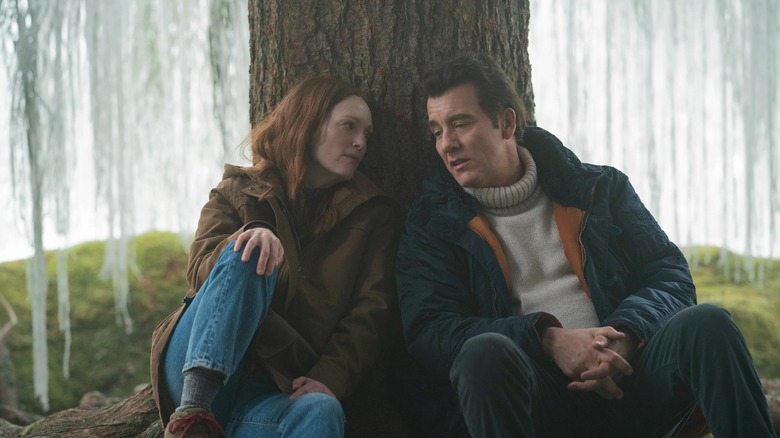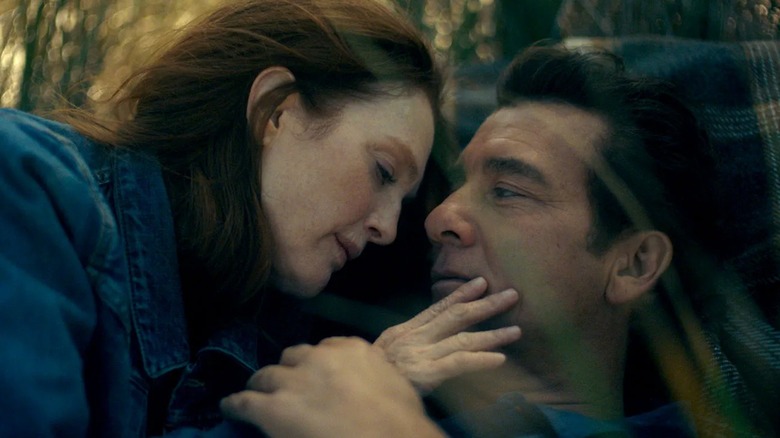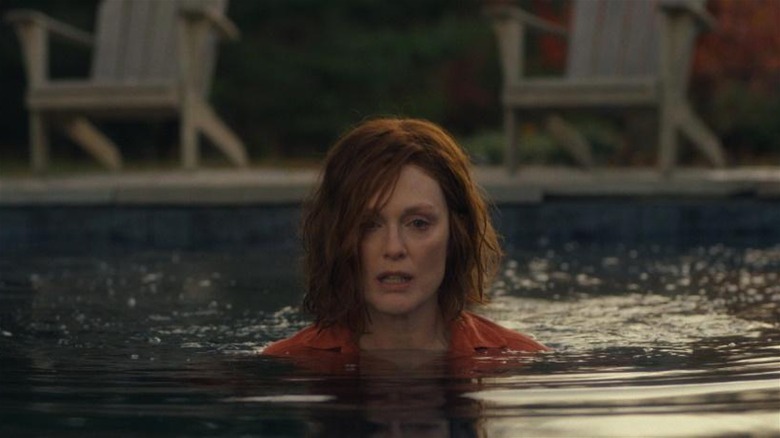How A True Crime Doc Pushed Stephen King To Finally Adapt Lisey's Story
In 2006, Stephen King's "Lisey's Story" won the Bram Stoker Award for its meticulous exploration of the art of writing, entwined with how repressed memories burst to the surface and begin to define who we are. King's novel examines what it means to be an author, where a mythical pool is likened to a wellspring of creativity, with the ability to both agonize and heal. Compared to most of King's works, "Lisey's Story" is a tad harder to breeze through — however, the halting nature of the story perfectly encapsulates the complexities of writing about something personal, along with the myriad emotions it evokes. This story in particular also holds deep personal meaning for King, contributing to the fact that it is still one of his favorite works.
The novel's focus is Pulitzer Prize-winning novelist Scott Landon, but the vignettes of his life are recounted through the eyes of Lisey, Scott's wife, who is grieving his death. Amid the dangers of being targeted by an obsessive fan, Lisey pieces Scott's memories together, weaving his posthumous legacy as he lived, breathed, and embodied his craft. This was inspired by an incident that occurred in King's life when he suffered a serious case of pneumonia (which almost killed him) and returned home to see his rearranged writing space, courtesy of his wife, Tabitha. Under the haze of recovery, and the surreal nature of viewing an intimate space rearranged by someone close to him, King wondered whether he was a ghost looking on as someone else picked up the pieces of who he was as an author.
This deep-seated emotion birthed "Lisey's Story," which he kept close to his heart when he was approached with possible adaptations of the tale until he felt it was the right time to translate it onto the screen.
How King endorsed an adaptation of Lisey's Story
Pablo Larrain's "Lisey's Story," an Apple TV+ miniseries written by King himself, received lukewarm reviews because it latched on tight to the source material without meaningful alterations warranted for dramatic depth. The performances, especially Julianne Moore's embodiment of Lisey, are worth checking out, and Larrain's miniseries embraces the strangeness embedded in King's novel, where the abstract nature of storytelling, and the lives lived through that lens, are dissected as one can best describe something that cannot be articulated.
When asked why King had finally decided that it was time to adapt his most personal work, the author told Entertainment Weekly that he was struck with inspiration after watching "The Assassination of Gianni Versace: American Crime Story," as he found the handling of the script particularly impressive:
"I saw this thing on FX [The Assassination of Gianni Versace: American Crime Story] that was about the fashion designer Versace and about the man who killed him. And I had not really thought about getting involved with 'Lisey' at that point or tackling it as a TV project, but I looked at that thing, and I said to myself, my goodness, this guy, Tom Rob Smith, wrote the whole thing. He wrote all eight or nine episodes, and I thought, well, if he could do that and bring it home and do such a great job, what about Lisey? And I sat down, and I started, and I showed the scripts to Ben Stephenson at Bad Robot one by one, and he was very encouraging."
King also explained that long-form television series formats on streaming platforms made space for narratives like "Lisey's Story," where there is a "chance to do more" with the freedom of exploring "a little more nuance."
Why Stephen King's Lisey's Story matters
Choosing a favorite among a vast, dynamic body of fictional work can be tricky, and King acknowledges this in his EW interview when he says that all of his works are his favorites, where "some of them are difficult children to love, some of them a little bit easier." "Lisey's Story" falls in the former category, as it intimately delves into the author's own sense of mortality, and how he will be perceived along with his works. King also explains why he held on to "Lisey's Story" for so long: he wanted to "be involved with writing it and guiding it to completion" when it felt like it was time to do so.
"Lisey's Story" is more than just a snapshot of an author's legacy, pieced together like a mindboggling jigsaw puzzle through the lens of someone who loves him. It also delves into stark realities where obsession and crippling anxieties meet, and a treasure hunt that leads to dark, yet fantastical revelations about the nature of the self, love, and every unnamable emotion shared between two people. Moreover, the pool of creativity, mythologized through the sacred space of Boo'ya Moon, feels both dangerous and nourishing, almost like a Lovecraftian entity that feeds into our fears due to its unknown nature, but in quintessentially King-fashion, also heals us when those fears are conquered.
Although Larrain's miniseries often feels tedious and incomplete, it is a worthy companion piece to the novel, allowing one to visualize these unutterable visions about our relationship to art and deep-seated fears about our impact on the world. While it is a personal story that stemmed from the darker, more vulnerable recesses of King's mind, it mirrors our inherent fears too — an irrefutable signifier of remarkably good fiction.


